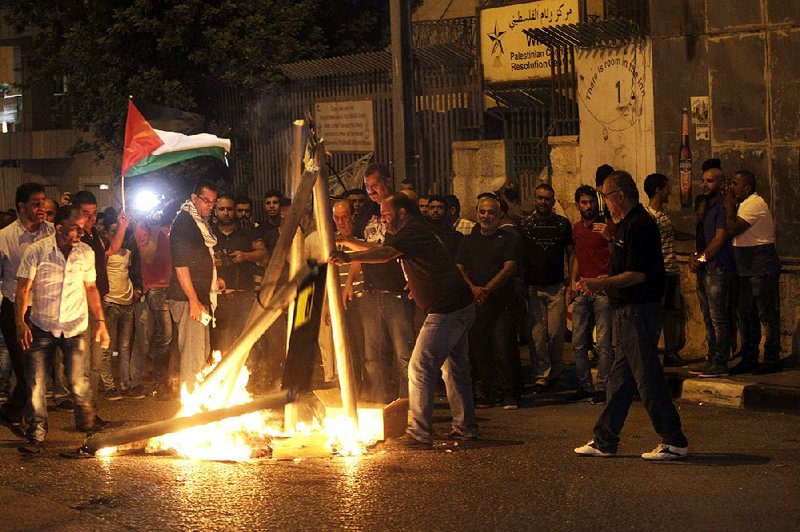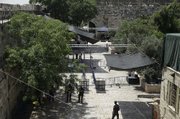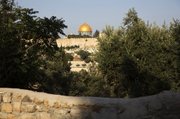JERUSALEM -- Israel's security Cabinet met Sunday to review a decision to install metal detectors at a contested Jerusalem holy site, after a week of escalating tensions with the Muslim world, mass prayer protests and Israeli-Palestinian violence.
The ministers met amid mounting controversy at home, with some critics saying the government had acted without sufficiently considering the repercussions of introducing new security measures at Al Aqsa Mosque, the Holy Land's most sensitive shrine and the epicenter of the Israeli-Palestinian conflict.
Three people, including an Israeli, were wounded by gunfire Sunday in a residential building in the fortified Israeli Embassy compound in Jordan's capital.
The kingdom's Public Security Directorate said that before the shooting, Jordanians had entered the apartment building for carpentry work, the statement said.
Two Jordanians later died, according to the agency and the news site Hala Akhbar, linked to the Jordanian military.
One of the Jordanians killed was a physician at the scene, the security agency said.
The site said the Israeli man was in "unstable" condition.
A Jordanian security official confirmed that two Jordanians had been killed and an Israeli wounded. He spoke on condition of anonymity because he was not authorized to discuss the incident with the media.
The Israeli Foreign Ministry had no immediate comment.
The metal detectors were installed a week ago in response to an attack by Arab gunmen who killed two Israeli policemen. Muslim religious leaders alleged Israel was trying to expand its control at the compound under the guise of security, a claim Israel denied.
Public Security Minister Gilad Erdan, a supporter of the security measures, on Sunday for the first time raised the possibility that the metal detectors might be removed, provided an alternative is found.
He said security measures at the 37-acre esplanade, with eight entry gates for Muslim worshippers, were insufficient before the shooting attack.
"We need different security measures and means for checking [those entering] there," he told Israel TV's Channel 2.
Erdan said it is "certainly possible that the metal detectors will be removed" if police recommend a different security program, but added that he is currently "not aware of such a program."
Muslim leaders signaled earlier Sunday that they would reject any new proposal that leaves additional security measures in place.
The top Muslim cleric of Jerusalem, Mohammed Hussein, told Voice of Palestine radio that he demands a complete return to the security measures before the shooting attack.
In a statement Sunday, the Islamic institutions in Jerusalem, of which he is a part, said they "affirm the categorical rejection of the electronic gates and all the measures of occupation."
Turkey's president condemned Israeli security precautions, saying the Islamic world would not remain silent.
Recep Tayyip Erdogan, addressing reporters Sunday in Istanbul before departing on a visit to Saudi Arabia, Kuwait and Qatar, said, "No one can expect the Islamic world to remain unresponsive after the humiliation Muslims suffered with the restrictions at the Noble Sanctuary."
Pope Francis told faithful Sunday in St. Peter's Square that he was following "with trepidation the grave tensions and violence" unleashed at the shrine.
"I feel the need to express a distressed appeal for moderation and dialogue," the pope said. He invited others to pray with him so people would aim for reconciliation and peace.
Disputes over the shrine, revered by Muslims and Jews, have set off major rounds of Israeli-Palestinian confrontations in the past.
On Friday, several thousand Palestinians clashed with Israeli security forces in the West Bank and in Jerusalem after noon prayers -- the centerpiece of the Muslim religious week.
Three Palestinians were killed and several dozen wounded after protesters burned tires and threw stones and firecrackers. Israeli troops responded with live rounds, rubber bullets and tear gas.
Late Friday night, a 20-year-old Palestinian stabbed and killed three members of an Israeli family in their home in a West Bank settlement.
The leader of the Islamic militant group that rules Gaza praised the attacker in a phone call to the attacker's father.
Ismail Haniyeh called the attack "heroic" Sunday and said the assailant "lifted the heads of the nation high."
The 20-year-old Palestinian jumped over the fence of a West Bank settlement and entered a house surprising a family that was celebrating a new grandchild during their traditional Sabbath meal. He stabbed to death Yosef Salomon, 70, and his children, 46-year-old Chaya and 35-year-old Elad, while his daughter-in-law escaped to another room to shelter her young children.
Prime Minister Benjamin Netanyahu denounced the attack as "an act of terror, carried out by an animal who was incited with unfathomable hatred." Netanyahu said at a ceremony Sunday soon after the victims were brought to rest that "terror will never defeat us."
At his weekly Cabinet meeting Sunday, Netanyahu said the killer's home would be demolished swiftly in retribution and those who incited and glorified his act would be dealt with.
Meanwhile, Palestinian President Mahmoud Abbas confirmed that an earlier decision to freeze ties with Israel on "all levels" also included a halt to security coordination. Abbas has said the freeze would remain in effect until the metal detectors have been removed.
Security coordination, largely aimed at a common foe, the Islamic militant group Hamas, had been a constant in frequently hostile Israeli-Palestinian relations. Ending those ties could quickly escalate tensions.
The official Palestinian news agency Wafa quoted Abbas as saying that "when we made these decisions, we took a firm and decisive stance, especially with regard to security coordination."
Abbas has coordinated closely with Jordan, the Muslim custodian of the shrine. Jordan has a peace treaty with Israel and the two countries cooperate in the battle against Islamic militants in the region, but frequently clash over Israeli policies at the Jerusalem shrine.
Jordan's official ties with Israel remain deeply unpopular in the kingdom, which has a large Palestinian population. On Friday, thousands marched in the capital Amman in an anti-Israel protest.
Information for this article was contributed by Ian Deitch, Karin Laub, Omar Akour and staff members of The Associated Press.
A Section on 07/24/2017


